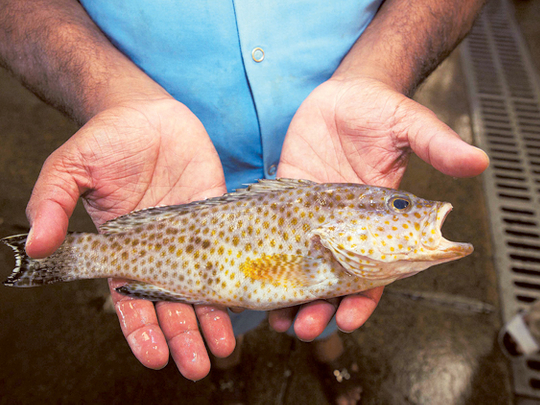
Abu Dhabi: A study of Arabian Gulf fish populations by a university student in Abu Dhabi could soon lend insightful clues to marine conservationists around the world.
The project, which looks into how fish species adapt to hot and saline Arabian Gulf waters, as well as how they mix with one another, is one of a handful of studies that delve into how fish populations get along in the region. It is being conducted by Remi Ketchum, a final-year student at New York University Abu Dhabi (NYUAD).
“Marine species play such a key role in supporting coastal populations. And to people familiar with underwater environments, they offer a real glimpse into biodiversity. We need to understand better how they can be conserved, and this is why I want to see how fish in the waters of the region survive,” Ketchum told Gulf News.
The 21-year-old American, who is majoring in chemistry, is focusing on three species of fish popularly sold in UAE markets: the hamour, the two-bar sea bream and the angelfish. She obtains tissue samples of these species and analyses them genetically, paying attention to variations between them.
“If there is evidence of breeding between fish populations obtained from waters in different areas, there is a greater chance that the species will be able to survive. This is known as connectivity. For example, if a harmful event affects fish in one area, the remaining fish can breed with fish in another population if they are sufficiently connected, and this will help replenish numbers,” Ketchum said.
Accordingly, there is a greater need to conserve populations that are very separate from others and, therefore, significantly more prone to endangerment.
Ketchum will also focus on finding out what makes the three fish species resilient to water conditions in the Gulf, which are unique due to extreme salinity and frequent temperature fluctuations.
“Global warming is increasing water temperatures everywhere, and the very hot, very saline waters of the Arabian Gulf could be a model of what reefs look like in future. So, finding out what makes fish resilient here — a change in physiology or genetic adaptation — could also shed light on what could help preserve other marine organisms,” Ketchum said.
The study should be completed by next year, and Ketchum, an avid diver, hopes her efforts will help promote further studies into marine conservation.
“I have been a certified diver since I turned 12 years old, and the kind of serenity you get when you witness marine biodiversity yourself is astonishing. I would like to protect these species, and hope to continue working in the field even after graduation,” the student said.
She also stressed that there is a great need for conservation in areas where coastal development is rife.
“The UAE is no exception to this rule, and there have already been initiatives to establish marine protected areas here. This is promising, but I believe that there is also still huge potential in the Gulf to prioritise such environmental conservation,” Ketchum said.













